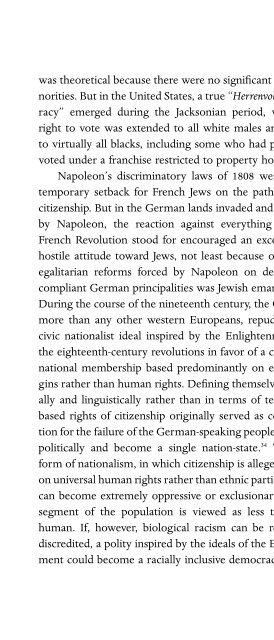Racism - A Short History - George M Fredrickson.pdf - WNLibrary
Racism - A Short History - George M Fredrickson.pdf - WNLibrary
Racism - A Short History - George M Fredrickson.pdf - WNLibrary
You also want an ePaper? Increase the reach of your titles
YUMPU automatically turns print PDFs into web optimized ePapers that Google loves.
EPILOGUE <strong>Racism</strong> in the Twenty-First Century<br />
Supreme Court has at times affirmed, despite constant<br />
threats from zealous members of the Protestant majority,<br />
might serve as a model for other religiously diverse nations.<br />
If the United States has for most of its history set a bad<br />
example in the area of race relations, it has established a<br />
relatively good record in its handling of the religious diversity<br />
resulting from immigration. 11<br />
Will the color line of the twentieth century therefore<br />
be replaced or overshadowed by the faith or creed lines of<br />
the twenty-first? Will conflicts more often take the form of<br />
jihads or crusades than movements for human rights or social<br />
justice? Many signs point in that direction. <strong>Racism</strong>, as<br />
we have seen, offers material and psychological rewards to<br />
an ethnic group that has the power and the will to dominate<br />
or eliminate another ethnic group that it defines as inherently<br />
different from itself in ways justifying the treatment it<br />
receives. The emotion to which it appeals is either contempt<br />
or fear, depending on whether the dominant group views<br />
the Other as under control and securely “in its place” or<br />
conceivably capable of competition or reprisal. Its essential<br />
context has been the rise of commercial and industrial capitalism,<br />
and its trigger has been the interests and anxieties<br />
aroused by that great historical transformation.<br />
But in the twenty-first century, we confront a global<br />
capitalism that draws no color line, because it seeks customers<br />
and collaborators from every race. A de facto color<br />
line remains because the non-Europeans of the world are,<br />
as a result of slavery, colonialism, or a late start on the path<br />
of modernization, on the average poorer and more disadvantaged<br />
than people of white or European ancestry. But<br />
active racism is not necessary to maintain this “new world<br />
148
















